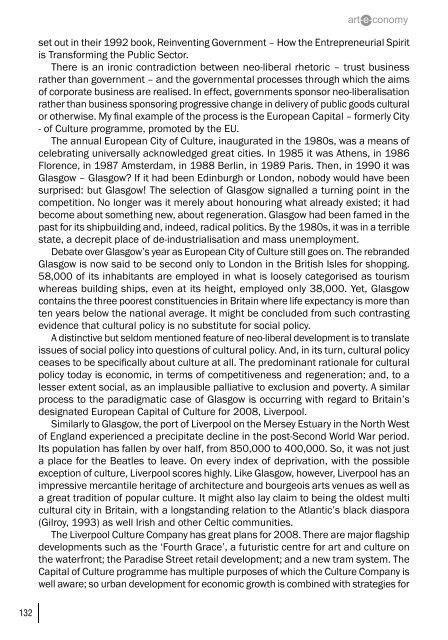art-e-conomy _ reader - marko stamenkovic
art-e-conomy _ reader - marko stamenkovic
art-e-conomy _ reader - marko stamenkovic
You also want an ePaper? Increase the reach of your titles
YUMPU automatically turns print PDFs into web optimized ePapers that Google loves.
132<br />
set out in their 1992 book, Reinventing Government – How the Entrepreneurial Spirit<br />
is Transforming the Public Sector.<br />
There is an ironic contradiction between neo-liberal rhetoric – trust business<br />
rather than government – and the governmental processes through which the aims<br />
of corporate business are realised. In effect, governments sponsor neo-liberalisation<br />
rather than business sponsoring progressive change in delivery of public goods cultural<br />
or otherwise. My final example of the process is the European Capital – formerly City<br />
- of Culture programme, promoted by the EU.<br />
The annual European City of Culture, inaugurated in the 1980s, was a means of<br />
celebrating universally acknowledged great cities. In 1985 it was Athens, in 1986<br />
Florence, in 1987 Amsterdam, in 1988 Berlin, in 1989 Paris. Then, in 1990 it was<br />
Glasgow – Glasgow? If it had been Edinburgh or London, nobody would have been<br />
surprised: but Glasgow! The selection of Glasgow signalled a turning point in the<br />
competition. No longer was it merely about honouring what already existed; it had<br />
become about something new, about regeneration. Glasgow had been famed in the<br />
past for its shipbuilding and, indeed, radical politics. By the 1980s, it was in a terrible<br />
state, a decrepit place of de-industrialisation and mass unemployment.<br />
Debate over Glasgow’s year as European City of Culture still goes on. The rebranded<br />
Glasgow is now said to be second only to London in the British Isles for shopping.<br />
58,000 of its inhabitants are employed in what is loosely categorised as tourism<br />
whereas building ships, even at its height, employed only 38,000. Yet, Glasgow<br />
contains the three poorest constituencies in Britain where life expectancy is more than<br />
ten years below the national average. It might be concluded from such contrasting<br />
evidence that cultural policy is no substitute for social policy.<br />
A distinctive but seldom mentioned feature of neo-liberal development is to translate<br />
issues of social policy into questions of cultural policy. And, in its turn, cultural policy<br />
ceases to be specifically about culture at all. The predominant rationale for cultural<br />
policy today is economic, in terms of competitiveness and regeneration; and, to a<br />
lesser extent social, as an implausible palliative to exclusion and poverty. A similar<br />
process to the paradigmatic case of Glasgow is occurring with regard to Britain’s<br />
designated European Capital of Culture for 2008, Liverpool.<br />
Similarly to Glasgow, the port of Liverpool on the Mersey Estuary in the North West<br />
of England experienced a precipitate decline in the post-Second World War period.<br />
Its population has fallen by over half, from 850,000 to 400,000. So, it was not just<br />
a place for the Beatles to leave. On every index of deprivation, with the possible<br />
exception of culture, Liverpool scores highly. Like Glasgow, however, Liverpool has an<br />
impressive mercantile heritage of architecture and bourgeois <strong>art</strong>s venues as well as<br />
a great tradition of popular culture. It might also lay claim to being the oldest multi<br />
cultural city in Britain, with a longstanding relation to the Atlantic’s black diaspora<br />
(Gilroy, 1993) as well Irish and other Celtic communities.<br />
The Liverpool Culture Company has great plans for 2008. There are major flagship<br />
developments such as the ‘Fourth Grace’, a futuristic centre for <strong>art</strong> and culture on<br />
the waterfront; the Paradise Street retail development; and a new tram system. The<br />
Capital of Culture programme has multiple purposes of which the Culture Company is<br />
well aware; so urban development for economic growth is combined with strategies for


